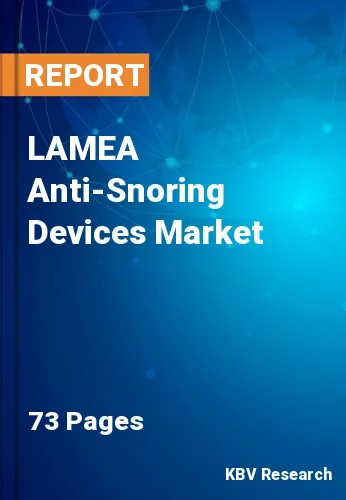The Latin America, Middle East and Africa Anti-Snoring Devices Market would witness market growth of 10.3% CAGR during the forecast period (2023-2030).
Alcohol consumption has increased significantly in the past few decades owing to various factors like higher disposable incomes, easy accessibility of alcohol, etc. A variety of mental and behavioral illnesses, other noncommunicable diseases, and injuries are all causally related to alcohol abuse.
The rise in demand for better healthcare services and an increase in the population of elderly people who are more prone to snoring are all contributing to the enormous growth of the healthcare sector in emerging nations. Innovative ideas like smart anti-snoring devices are enhancing the usefulness of everyday objects and getting them to do more than they were designed to. IoT connectivity options have expanded these gadgets' fundamental capabilities by allowing them to communicate with other household electronics. This is due to high patient compliance, as these are accessible at dentist offices and online, making it simple for manufacturers to promote their goods.
The Middle East region experienced increased demand for healthcare services, as well as a growing emphasis on wellness and preventative care, along with increased cooperation between private and public sectors. The Saudi Medical Journal verified that nearly one in three Saudi individuals experience short sleep every night, which is common in Saudi Arabia. With 24.2 million smartphone users, the Kingdom is third in the world for smartphone usage, with about 92% of the population browsing smartphones and over 83.83% utilizing the internet. Increased mobile usage is responsible for interrupted sleep and bad posture, which increases the likelihood of snoring. Hence, the region provides immense possibilities for the expansion of the market.
The Brazil market dominated the LAMEA Anti-Snoring Devices Market by Country in 2022 and would continue to be a dominant market till 2030; thereby, achieving a market value of $7.8 Million by 2030. The Argentina market is poised to grow at a CAGR of 10.8% during (2023 - 2030). Additionally, The UAE market would exhibit a CAGR of 9.9% during (2023 - 2030).
Based on End User, the market is segmented into Homecare, and Others. Based on Product, the market is segmented into Mouthguard (Mandibular Advancement Devices, and Tongue Retaining Device), Nasal Devices, EPAP Device, and Others. The report also covers geographical segmentation of Anti-Snoring Devices market. Based on countries, the market is segmented into Brazil, Argentina, UAE, Saudi Arabia, South Africa, Nigeria, and Rest of LAMEA.
Free Valuable Insights: The Worldwide Anti-Snoring Devices Market is Projected to reach USD 403.6 Million by 2030, at a CAGR of 7.5%
The market research report covers the analysis of key stake holders of the market. Key companies profiled in the report include Koninklijke Philips N.V., ResMed, Inc., SomnoMed Limited, The Pure Sleep Company, TAP Sleep Care, VVFLY Electronics Co., Ltd., Apnea Sciences Corporation, ZQuiet (Sleeping Well, LLC), and DentCare Dental Lab Pvt. Ltd.
By End User
By Product
By Country
Our team of dedicated experts can provide you with attractive expansion opportunities for your business.

